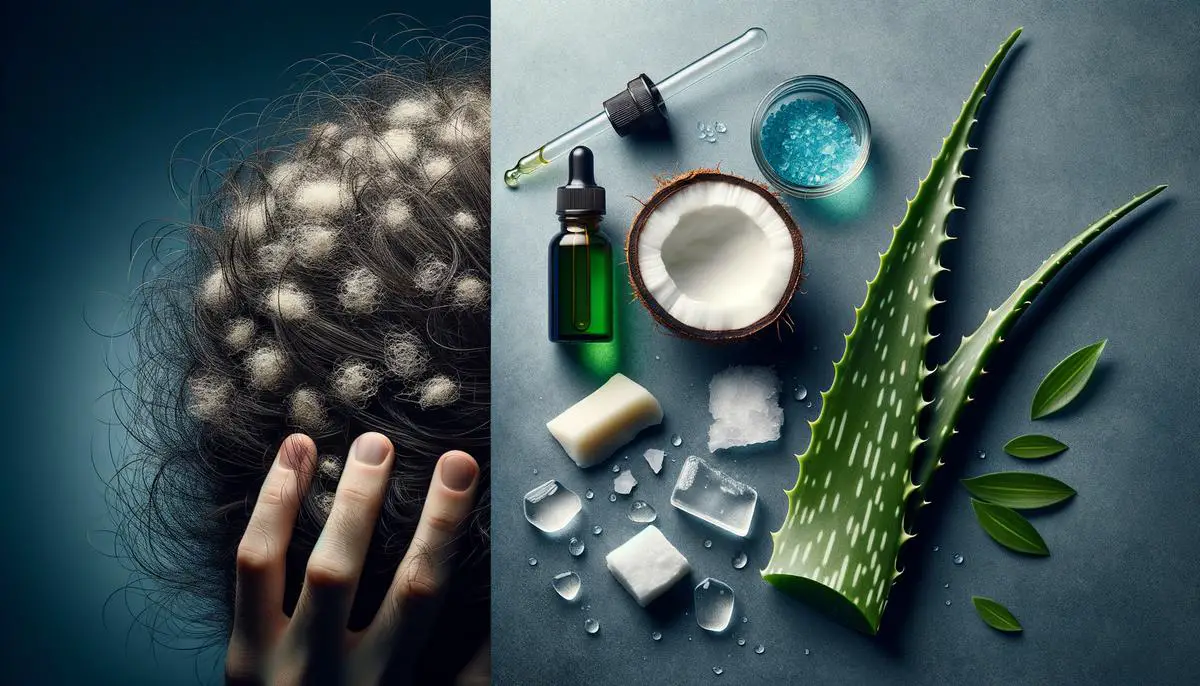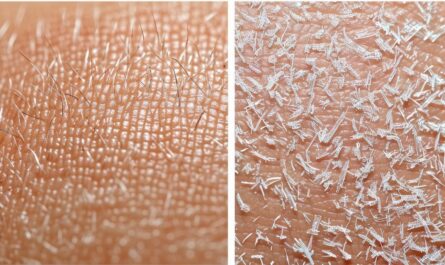Understanding Dandruff Causes
Dandruff, those pesky flakes on your scalp and shoulders, can be frustrating to deal with. Let’s explore what causes this common scalp problem.
Malassezia globosa, a naturally occurring fungus, can contribute to dandruff when it overproduces on oily scalps. Seborrheic dermatitis, a more severe form of dandruff, may cause oily patches and redness on the scalp and other areas of the body.
Skin conditions like psoriasis can also lead to scalp flaking. Your hair care routine plays a role too – both under-washing and over-washing can trigger dandruff. Stress, while not a direct cause, can exacerbate existing dandruff issues.
Other factors include:
- Sensitivity to hair products
- Nutritional deficiencies (particularly B vitamins and zinc)
- Climate changes
- Oily skin
It’s important to note that dandruff isn’t simply about poor hygiene – it’s a complex issue with various contributing factors.
Understanding these causes can help you better address your dandruff concerns and find effective solutions.

Effective Home Remedies
Natural remedies can be effective in managing dandruff. Here are some options to try:
1. Tea tree oil
Known for its antimicrobial properties, it can help address the Malassezia fungus. Mix a few drops with a carrier oil like coconut or jojoba, apply to your scalp, massage gently, leave for 15 minutes, then rinse thoroughly.
2. Coconut oil
This moisturizing oil contains lauric acid, which can help create a less hospitable environment for fungi. Warm a tablespoon of coconut oil, massage into your scalp, leave overnight, and rinse with a gentle shampoo in the morning.
3. Aloe vera
With its anti-inflammatory properties, aloe can soothe an irritated scalp. Apply fresh aloe gel directly to your scalp, let it sit for about 30 minutes, then wash out with a mild shampoo.
4. Apple cider vinegar (ACV)
It can help balance scalp pH. Mix equal parts ACV and water in a spray bottle, apply to your scalp, let it sit for 15 minutes, then rinse with lukewarm water.
5. Baking soda
A gentle exfoliant that can help remove dead skin cells. Sprinkle a small amount onto damp hair, massage in for a minute or two, then rinse off.
Remember to do a patch test before trying any new remedy to ensure your scalp doesn’t react negatively.

Diet and Lifestyle Adjustments
Your diet and lifestyle can significantly impact dandruff management. Here are some adjustments that may help:
Diet
- Include foods rich in omega-3 fatty acids (like salmon, walnuts, and flaxseeds) to help maintain scalp hydration and balance oil production.
- Ensure you’re getting enough B vitamins and zinc from lean meats, dairy, nuts, and leafy greens.
- Incorporate antioxidant-rich foods like berries and vegetables to reduce inflammation.
- Limit processed foods and sugary treats, as they may exacerbate scalp issues.
Stress management
Stress can worsen dandruff, so incorporate relaxation techniques into your routine. Try meditation, yoga, deep breathing exercises, or any activity that helps you unwind.
Hair care routine
- Use anti-dandruff shampoos containing ingredients like zinc pyrithione.
- Condition your hair, but avoid applying conditioner directly to your scalp if you have oily skin.
- Find the right washing frequency for your hair type – neither too often nor too seldom.
Product use
Minimize the use of styling products, as they can build up on your scalp and contribute to dandruff. Choose gentle, non-irritating hair care products.
By making these dietary and lifestyle adjustments, you can create a more balanced environment for your scalp and potentially reduce dandruff occurrences.

When to Seek Professional Help
While home remedies can be effective, there are times when professional help is necessary. Consider consulting a dermatologist or healthcare provider if:
- Dandruff persists despite consistent use of home remedies and over-the-counter treatments.
- You notice redness, swelling, or open sores on your scalp, which could indicate a more serious condition like psoriasis or eczema.
- The itching is severe and persistent, causing discomfort or interfering with daily life.
- You suspect an allergic reaction to hair care products.
A healthcare professional can provide a proper diagnosis and recommend appropriate treatments, which may include:
- Prescription-strength anti-fungal shampoos or lotions
- Corticosteroids to reduce inflammation
- Tailored treatment plans for underlying skin conditions
They can also offer personalized advice on hair care routines and lifestyle factors that may be affecting your scalp health.
Remember, seeking professional help doesn't mean you've failed in managing your dandruff. It's a proactive step towards finding the most effective solution for your specific situation.

Understanding the causes and remedies for dandruff is crucial for managing this common scalp issue. By recognizing the factors that contribute to dandruff, you can better address them with both natural and professional solutions, ensuring a healthier and more comfortable scalp.
- Satchell AC, Saurajen A, Bell C, Barnetson RS. Treatment of dandruff with 5% tea tree oil shampoo. J Am Acad Dermatol. 2002;47(6):852-855.
- Gavazzoni Dias MF. Hair cosmetics: an overview. Int J Trichology. 2015;7(1):2-15.
- Gupta AK, Nicol K, Batra R. Role of antifungal agents in the treatment of seborrheic dermatitis. Am J Clin Dermatol. 2004;5(6):417-422.
- Dawson TL Jr. Malassezia globosa and restricta: breakthrough understanding of the etiology and treatment of dandruff and seborrheic dermatitis through whole-genome analysis. J Investig Dermatol Symp Proc. 2007;12(2):15-19.
- Borda LJ, Wikramanayake TC. Seborrheic Dermatitis and Dandruff: A Comprehensive Review. J Clin Investig Dermatol. 2015;3(2):10.




